The weather has started to get hot, and you switch on your air-conditioner. It’s working, but it’s not cooling the room as effectively and efficiently as before. Your electricity bill is rising.
This issue is probably due to a blanket of dirt impeding airflow on your AC coils. Here are some easy steps to take off and clean your AC coil.
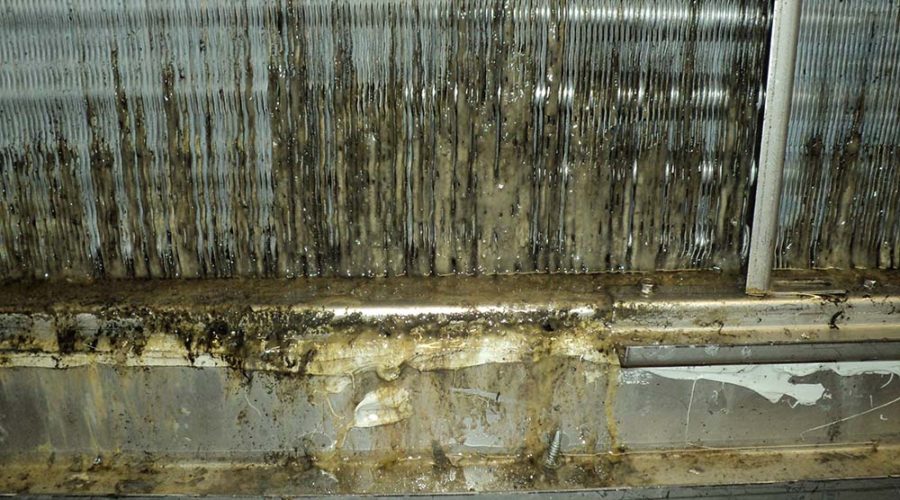
Photo credit: alltimeairconditioning.com
Project Metrics
Working Time
It usually takes about half an hour to clean your AC, however, schedule an hour if it’s your first time taking on this task.
Prep Time
It should take about ten minutes to gather your materials and go through the manual to remove the AC coil.
Skill Level
This is an easy task, even if it’s your first time doing it.
Material Cost
The cost is minimal as the materials that you use are usually in your home. However, if you are buying commercial oil cleaners and fin and coil brushes, then the average cost can be ten dollars.
How to Clean Air Conditioner Coils
In a typical split-system AC unit, there are two types of coils. The evaporator coil is found in the unit’s indoor part, and the condenser coil is on the outdoor unit.
The evaporator coil’s function is to remove heat from the air inside the home, and with the help of the refrigerant, you’re able to get cold air. The fan in the unit will blow the hot air over the condenser coils, and the captured heat is let out on the outside.



Photo credit: Glassreplacementwindow.blogspot.com
These two coils have to be in reliable condition for your air conditioner to have a successful, effective cooling system. Thus, cleaning the coils ensures that the AC unit is at optimal function.
There are some tools you may require to begin the task, depending on the mechanism of cleaning. These tools are a screwdriver, garden hose, cleaner of your choice, and a coil or fin brush. Here are a few necessary steps on how to clean your AC coils:
Accessing the AC Coils
Turn off your air conditioner and disconnect it from the power source. You can access the coils for split-units AC from the part outside the house. If you have a central air unit then simply unscrew and remove the access panel to access the coils.
We suggest you look at the operator’s user manual for the specs diagram for your specific AC. Check for the coils in the manual and how to remove the cover or fan if needed.
Some fans may be attached to the air-conditioner grille, and there may be a wiring harness that connects the fan to the interior of the unit. Make sure this is set aside carefully on the unit.
It’s also wise to keep screws and other fasteners aside safely.
Remove Loose Dust and Dirt
Scan the coils for loose dust and dirt such as spider webs, lumps of dirt, or any other large debris like twigs or leaves. Take these out with your hands.
Use a coil brush to dust the coil. Make sure you brush parallel to the fins to avoid bending the fins. If you don’t have a coil brush, a paintbrush will also work.



Photo credit: Sunlineclub.com
Straighten Bent Fins
You can skip this step if there aren't any bent fins or if you don’t have a fin brush. You can notice bent fins by the way it reflects light. It puts a bright shine on some sections of the coil.
If there are bent fins, then run the fin brush parallel and slowly in line with the fins to straighten them out.
Rinsing the Coil
If you’d like to see how dirty the fins are in the coil, shine a light from inside the unit through the fins, and you’ll see how much dust and grime is in it.
Rinse the coils with a hose if it’s outdoors. We suggest you refrain from using a power washer because it can bend the fins inside the AC unit.
If the coil is indoors, you can use a foaming coil cleaner directly to clean the coils. However, this is a more expensive option, so best to remove indoor units and take them outside to clean them.
Soaking the Coil
Cover the coil with your chosen cleaning agent. Then let it soak for the next five to ten minutes to loosen dirt and grime.
Rinse-Off the Cleaning Agent
Use the hose to gently spray off the loosened dirt from the coil. It’ll take a few rinses to get all the grime out. As the cleaning agent comes off the coil, it will remove the dirt and grime with it, leaving a clean coil.
If you used a water-free cleaner, switch your air-con back on; the foam-cleaner will condensate.
Reassemble the Air-Conditioning Unit
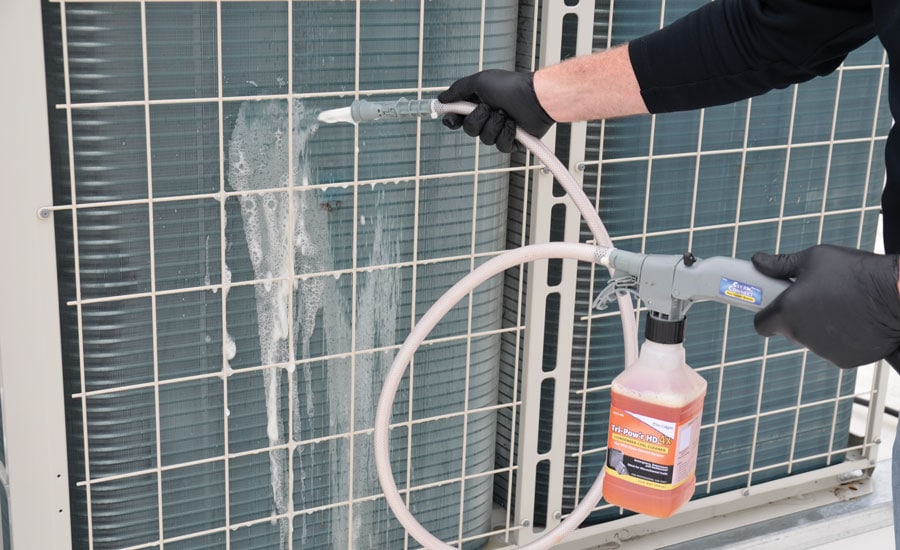


Photo credit: Achrnews.com
Return the access covers and fans, and screw or bolt them back in place. Refer to your operator’s manual again if you used it to dismantle the unit. It will give you clear instructions if needed.
Once everything is in place, then turn the air conditioning unit on.
What Can I Use to Clean AC Coils?
There are several cleaning agents that you can use to clean the air conditioner coils. These agents are all safe to use on the coils.
How to Clean Coils With Compressed Air
Compressed air can be used to clean lighter accumulations of dirt from the AC coil. You can direct the compressor in the opposite direction of normal airflow of the AC. Do this from the cleaner to the dirtier side of the coil.
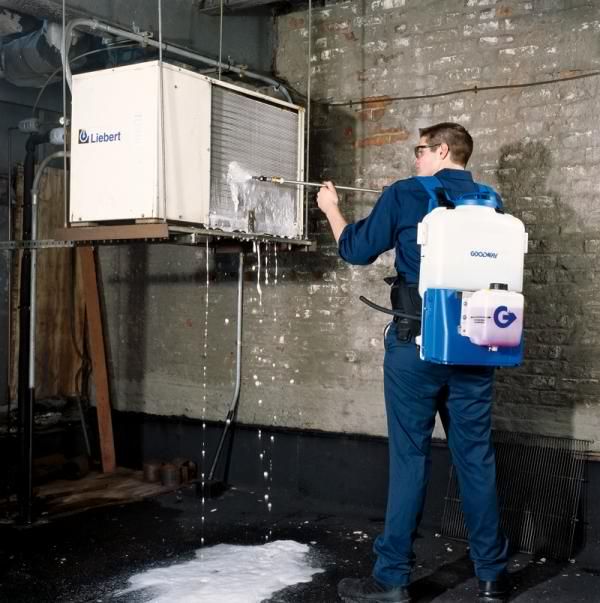


Photo credit: Miamiacexperts.com
If some of the debris is stubborn, place the compressor nozzle to the bottom of where the stubborn dirt is situated.
The air should be directed at a ninety-degree angle or straight through the fins. Using compressed air in this manner will prevent the fins from getting damaged.
Keep the airflow consistent over the coil to dislodge the buildup while cleaning. This helps avoid forcing the dirt further into the fins that make it more challenging to draw out.
Remember to use protective eyewear, so no dust gets into your eyes.
How to Clean Coils With Household Cleaner
You can also clean your coils with regular household cleaners instead of commercial cleaners. A mild detergent and warm water work great.
Use a spray bottle or garden sprayer, that contains a solution of warm water and household detergent to apply to the coils. Allow the solution to soak for a couple of minutes to loosen the dust, dirt, and debris. Then wipe away the loosened debris with a soft brush or cloth. Repeat the steps if needed.
How to Clean Coils With Commercial Coil Cleaners
When coils are heavily soiled, it’s best to use commercial coil cleaners. There are many brands of commercial coil cleaners available on the market. Most of them are the foam-cleaners that break down tough grime. You need to see which product will do the job best and suits your budget. The best people to consult with are trusted local stores that deal with these products for suggestions.
To use these products, follow the necessary steps above to clean air conditioner coils or simply follow the product’s instructions and precautions.
Necessary Steps:
- Spray the cleaner on the coils as directed in the product instructions.
- Give the foaming action some time to work.
- Wait for the foam to drain away, taking the debris with it.
- Repeat actions until the coils are clean and have no buildup.



Photo credit: youtube.com
Can I Use Vinegar To Clean AC Coils?
You can also use household vinegar to clean your air conditioner coils. In a spray bottle, use a solution of half white vinegar and half water to apply to the coils. You could add a teaspoon of baking soda and/or a light dishwashing detergent to the solution if you wanted to. Either solution will work well to loosen the grease.
Once you’ve sprayed the solution onto the coils, give it a few minutes to lift the grime. Take a soft cloth and wipe out the loosened dirt. Repeat many times until the coils are clean. This solution also helps to prevent future grease buildup quickly.
Why Clean My Air Conditioner Coils?
The number one enemy of your AC is dust. Studies have shown that a home collects forty pounds of dust yearly. It insulates the coils, but dust can also clog AC ducts that affect the AC unit’s efficiency and contribute to a drop in air quality.
For an AC that works efficiently, the unit must transfer heat from inside to outside successfully. A coating of dirt, dust, and other debris on the A/C coils can prevent this by insulating the coils and reducing the heat transfer process’s efficiency.
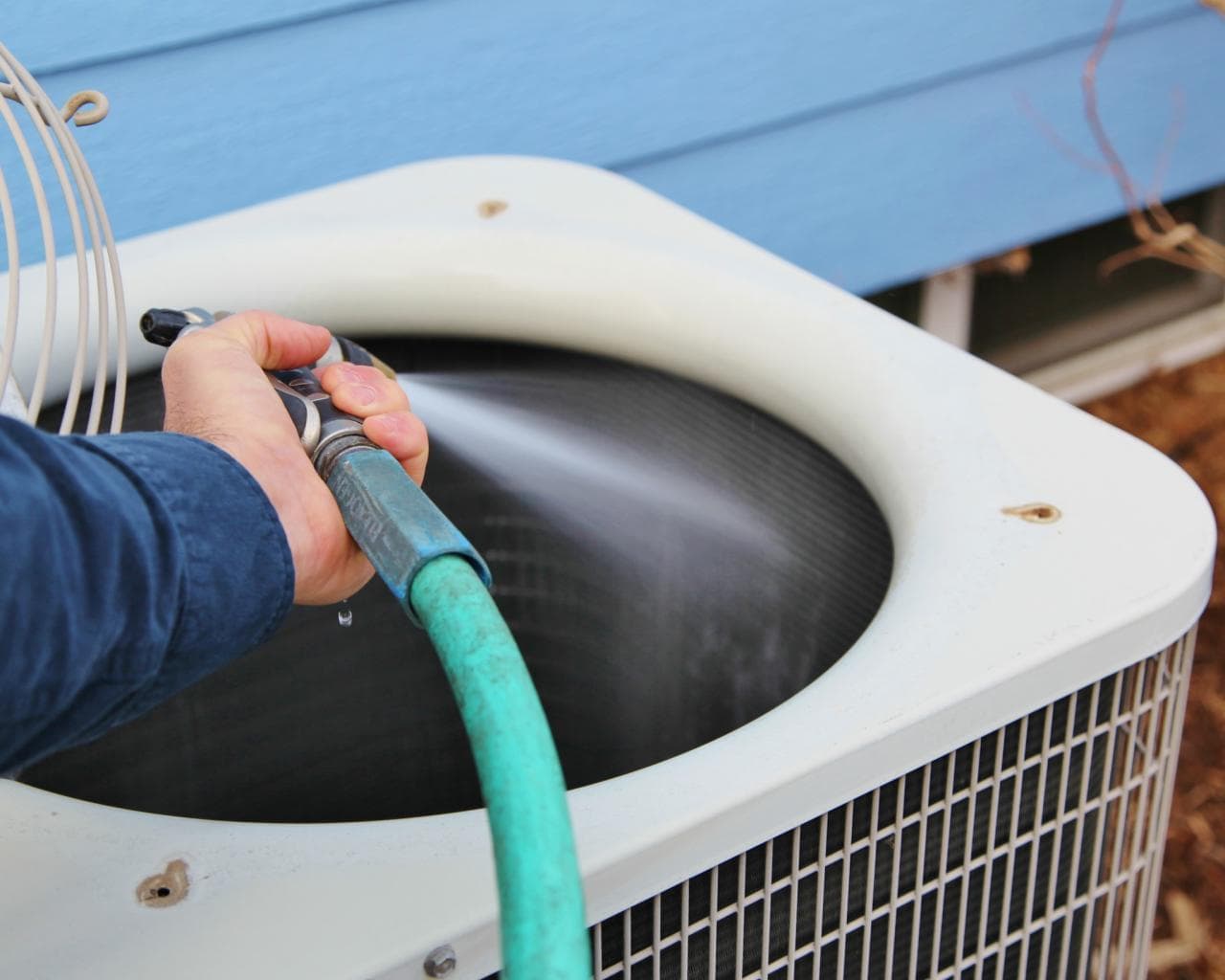


Photo credit: Diynetwork.com
There are several steps to how an air conditioner works, and when any of these steps are impeded by dust and grime settled on the coils, the reliability, and effectiveness of your AC decreases.
Furthermore, a decrease in heat transfer can cause other issues such as frozen evaporator coils and compressor overheating.
Coils covered with dirt will trap heat in the condenser coil. In turn, the evaporator coil will have a problem absorbing the heat. The AC system will have to work harder and longer to cool the air. It will battle to reach the required temperatures and remove air humidity.
Too much humidity will lead to mildew, mold, and bacteria, which is not suitable for your health. Furthermore, the AC’s inefficiency will increase your utility bill, costing you more in the long-run.
Sulfur from soot can also damage coils causing the refrigerant to leak. If there isn’t enough refrigerant, then your AC won’t cool properly.
Safety Tips for Cleaning Air Conditioner Coils
Cleaning air conditioner coils is a reasonably safe project to manage. However, there are some precautions and safety that should be implemented while on the job.
Equipment Safety
- The essential thing to do is to switch off the air conditioner by cutting power to the device. This is done by pulling the breaker at the panel.
- It’s important not to interfere with any wiring inside the panel. Don’t disconnect any wires.
- If the fan is attached to the inside of the unit with a wiring harness, make sure it’s placed safely on one side on top of the unit. Avoid getting water into the fan.
Personal Protection
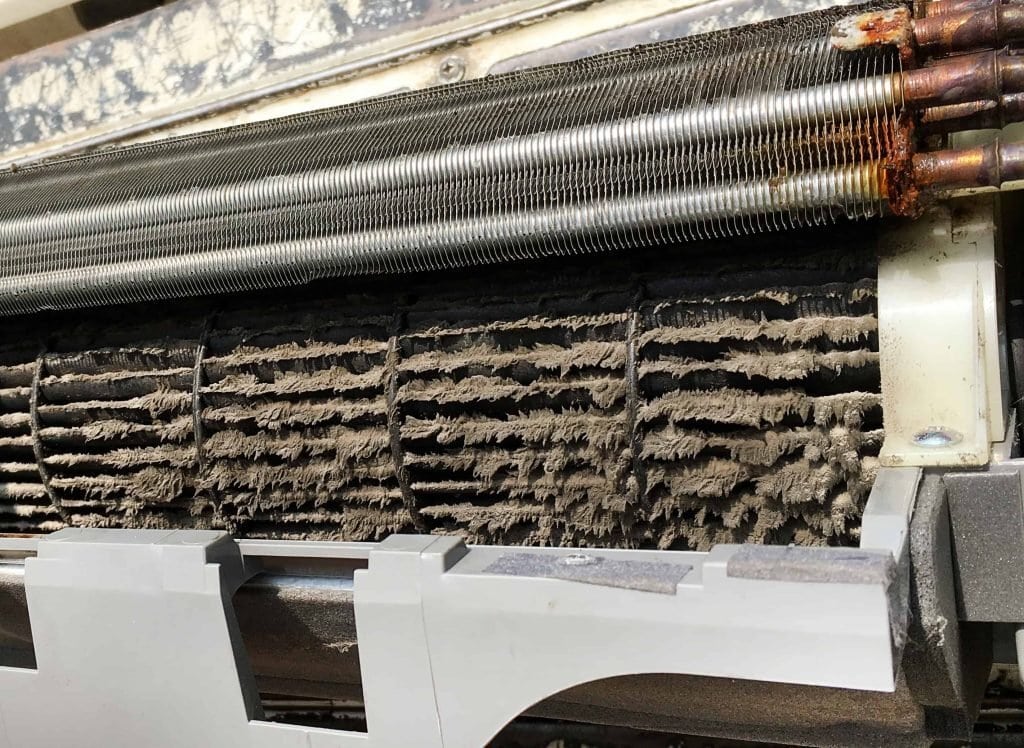


Photo credit: dayandnightair.com
Proper Handling of Commercial Cleaners
It’s essential to handle commercial coil cleaners with care because misuse can result in personal injury, equipment damage, and environmental degradation. Here are some tips on how to handle commercial cleaners.
- It’s essential to read and follow the label instructions.
- Don’t mix different brands of coil cleaners.
- Don’t use cleaners that have acid indoors.
- Don’t leave commercial cleaners unattended.
- Store in a safe place away from children and animals
- Always spray downwind when using outdoors.
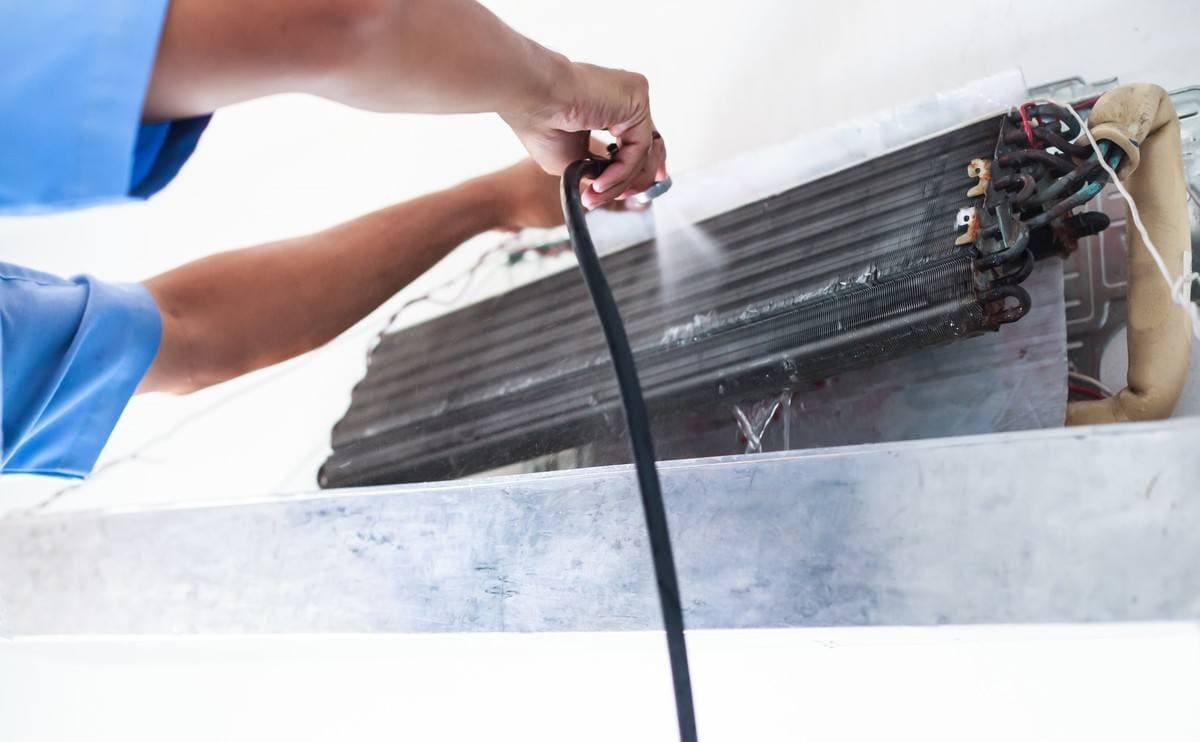


Photo credit: Fixr.com
Conclusion
Air conditioners have become a necessity on hot, humid days. But if the coils are not properly maintained, it can cause your AC unit to work inefficiently and ineffectively. The air conditioner will have to work harder and longer.
Even though there are safety precautions to consider when scouring AC coils, this job is something you can do yourself. Following a yearly routine of cleaning the AC, coils can increase reliability, improve air quality, and avoid increased utility costs. You can follow the necessary steps in cleaning the coil that won’t take more than an hour.
People Also Ask
Cleaning air conditioning coils is a reasonably easy task to take on. It saves you the hassle and money of getting a contractor out to you. It also ensures that your AC is working at optimal levels, and there is no restriction of proper airflow and release of hot air. However, there are some common queries people have in cleaning AC coils.
What Can I Use to Clean My AC Coils?
There are several cleaning agents to clean your AC coils. Air compressors, commercial foam-cleaner, standard household detergents, and homemade vinegar solutions can clean air conditioner coils.
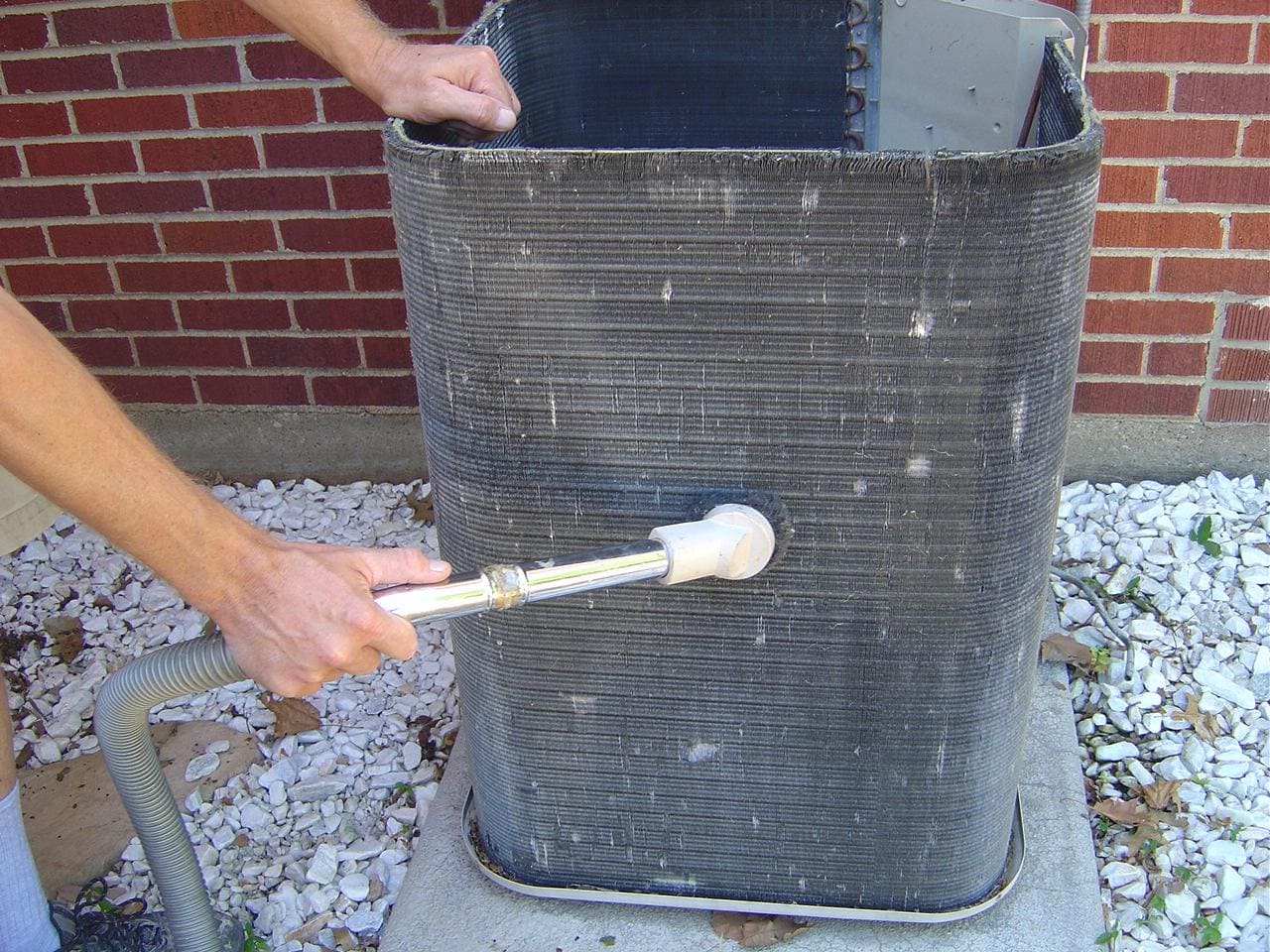


Photo credit: yourdallashandyman.com
What is the Best AC Coil Cleaner?
There’s no best AC coil cleaner as it depends on your preferred method and how much debris, dirt, and grime the coil has. However, if purchasing a commercial coil cleaner, look out for cleansers that are alkaline-based, USDA authorized, have no harmful additives, and have the best price value.
How Do You Make Homemade Coil Cleaner?
To make homemade coil cleaner, use half part white vinegar and half part water solution. You can add a teaspoon of bicarbonate of soda to the solution. If you want a soapier mix, add a few drops of the typical mild dishwasher to baking soda, vinegar, and water solutions.
How Often Should I Clean My AC Coils?
You can minimize the usage of energy and decrease electricity costs. The air conditioner coils should be cleaned annually. A dirty evaporator and condenser coil can increase energy usage by about thirty percent.
